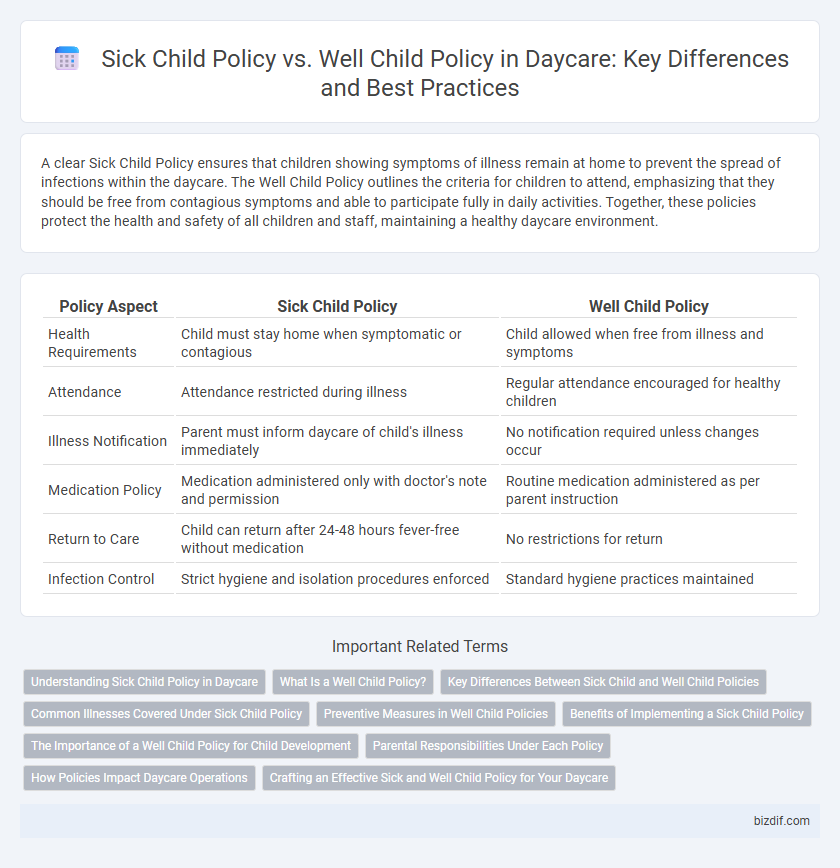A clear Sick Child Policy ensures that children showing symptoms of illness remain at home to prevent the spread of infections within the daycare. The Well Child Policy outlines the criteria for children to attend, emphasizing that they should be free from contagious symptoms and able to participate fully in daily activities. Together, these policies protect the health and safety of all children and staff, maintaining a healthy daycare environment.
Table of Comparison
| Policy Aspect | Sick Child Policy | Well Child Policy |
|---|---|---|
| Health Requirements | Child must stay home when symptomatic or contagious | Child allowed when free from illness and symptoms |
| Attendance | Attendance restricted during illness | Regular attendance encouraged for healthy children |
| Illness Notification | Parent must inform daycare of child's illness immediately | No notification required unless changes occur |
| Medication Policy | Medication administered only with doctor's note and permission | Routine medication administered as per parent instruction |
| Return to Care | Child can return after 24-48 hours fever-free without medication | No restrictions for return |
| Infection Control | Strict hygiene and isolation procedures enforced | Standard hygiene practices maintained |
Understanding Sick Child Policy in Daycare
The Sick Child Policy in daycare centers outlines specific guidelines to prevent the spread of illness, requiring parents to keep children at home if they exhibit symptoms such as fever, vomiting, or contagious infections. This policy ensures a healthy environment by minimizing exposure to germs and safeguarding the well-being of all children and staff. Adhering to the Sick Child Policy reduces absenteeism and supports a quicker recovery process for sick children before returning to the daycare setting.
What Is a Well Child Policy?
A Well Child Policy in daycare settings outlines the criteria for children attending when they are healthy, emphasizing regular attendance, proper hygiene, and up-to-date immunizations to prevent illness spread. It defines symptoms that are not contagious and allows children showing mild, non-infectious conditions to participate in daily activities. This policy supports consistent care while maintaining a safe environment for all children and staff.
Key Differences Between Sick Child and Well Child Policies
Sick Child Policies in daycare typically require parents to keep children at home when exhibiting contagious symptoms such as fever, vomiting, or persistent cough to prevent the spread of illness. Well Child Policies emphasize regular attendance when children are symptom-free, promoting consistent social interaction and learning opportunities. The key differences lie in health criteria for attendance, with Sick Child Policies prioritizing infection control and Well Child Policies focusing on developmental and social benefits.
Common Illnesses Covered Under Sick Child Policy
Sick Child Policies typically cover common illnesses such as colds, flu, strep throat, and contagious infections like chickenpox or hand, foot, and mouth disease, ensuring appropriate care and preventing spread within the daycare environment. Well Child Policies focus on routine health maintenance including vaccinations, developmental screenings, and wellness checks to support overall child development and early detection of potential health issues. Clear differentiation between these policies helps daycare providers manage children's health effectively while promoting a safe and healthy learning atmosphere.
Preventive Measures in Well Child Policies
Well Child Policies in daycare centers emphasize preventive measures such as routine health screenings, timely vaccinations, and hygiene education to minimize illness risks and promote overall child wellness. These proactive strategies contrast with Sick Child Policies, which focus on managing symptoms and preventing the spread of contagious diseases after a child displays signs of illness. Implementing robust Well Child Policies supports a healthier daycare environment by reducing absenteeism and enhancing developmental outcomes.
Benefits of Implementing a Sick Child Policy
Implementing a Sick Child Policy in daycare settings reduces the spread of infectious diseases, ensuring a healthier environment for all children and staff. It minimizes absenteeism by encouraging parents to keep sick children at home, promoting faster recovery and preventing outbreaks. Clear guidelines foster trust and communication between caregivers and families, enhancing overall safety and well-being.
The Importance of a Well Child Policy for Child Development
A Well Child Policy in daycare settings ensures children attend when they are healthy, promoting consistent social interaction and cognitive growth vital for early development. Regular attendance under this policy supports the building of secure attachments with caregivers and peers, fostering emotional stability and communication skills. Maintaining a healthy environment reduces the spread of illness, allowing uninterrupted participation in learning activities crucial for overall child development.
Parental Responsibilities Under Each Policy
Parental responsibilities under the Sick Child Policy require prompt notification of symptoms and keeping the child at home to prevent the spread of illness within the daycare. In contrast, the Well Child Policy expects parents to ensure their child is symptom-free and up-to-date on vaccinations before attending. Both policies emphasize clear communication and adherence to health guidelines to maintain a safe environment for all children.
How Policies Impact Daycare Operations
Sick child policies require immediate exclusion of children exhibiting symptoms of contagious illnesses, reducing the risk of disease transmission and maintaining a healthier environment for all attendees. Well child policies focus on regular health checks and vaccination compliance to ensure only healthy children participate, promoting consistent attendance and streamlined scheduling. These policies collectively enhance operational efficiency by minimizing unexpected absences, safeguarding child health, and maintaining regulatory compliance in daycare settings.
Crafting an Effective Sick and Well Child Policy for Your Daycare
Crafting an effective Sick and Well Child Policy for your daycare ensures clear guidelines for when children should stay home, minimizing illness spread and maintaining a healthy environment. Emphasize specific symptoms such as fever, vomiting, or contagious conditions to define exclusion criteria, while also outlining the criteria for children to return, like being symptom-free for 24 hours. Clear communication with parents and staff about these policies promotes consistent enforcement and safeguards all children's well-being.
Sick Child Policy vs Well Child Policy Infographic

 bizdif.com
bizdif.com